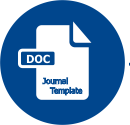Pengembangan Jan Hagel Cookies dengan Substitusi Tepung Mocaf (Modified Cassava Flour)
DOI:
https://doi.org/10.12928/jfc.v7i2.12278Keywords:
jan hagel cookies, substitusi, tepung mocafAbstract
Penelitian ini dilatarbelakangi oleh permasalahan jumlah konsumsi tepung terigu di Indonesia yang kian meningkat setiap tahunnya. Indonesia telah mengonsumsi tepung terigu sebanyak 2,7 kg perkapita pertahun pada 2022 dan bertambah menjadi 2,9 kg perkapita pertahun pada 2023. Tingginya konsumsi tepung terigu ini mengindikasikan bahwa diperlukan substitusi bahan lain sebagai pengganti tepung terigu. Tujuan penelitian untuk memperoleh formulasi yang tepat dan dapat diterima pada produk jan hagel cookies substitusi tepung mocaf. Metode penelitian yaitu kuantitatif eksperimen dengan pendekatan QDA (Quantitative Descriptive Analysis). Langkah penelitian diawali dengan proses uji coba mendapatkan resep standar hingga menghasilkan 2 sampel, yaitu produk dengan kode sampel produk JH1 dan JH2. Sampel JH2 ini kemudian dijadikan acuan pengembangan produk. Pengembangan produk jan hagel cookies ini menghasilkan 2 kode sampel, yaitu JH75 (75% tepung mocaf : 25% tepung terigu) dan JH100 (100% tepung mocaf : 0% tepung terigu). Sampel produk JH75 merupakan produk terpilih berdasarkan penilaian dari panelis ahli, dengan karakteristik sensoris warna kuning kecoklatan, tekstur renyah, bentuk persegi panjang, rasa manis dengan aroma kayu manis yang kuat. Hasil uji daya terima sampel produk JH75 mendapat skor 129,8 yang menunjukkan bahwa produk jan hagel cookies substitusi tepung mocaf sangat disukai panelis.
References
Andriani, N. S. (2022). Analisis faktor-faktor yang mempengaruhi volume impor gandum Indonesia periode 1990-2020 [Disertasi]. Jambi: Universitas Jambi.
Asmoro, N. W. (2021). Karakteristik dan sifat tepung singkong termodifikasi (mocaf) dan manfaatnya pada produk pangan. Journal of Food and Agricultural Product, 1(1), 34- 43.
Broek, R.V. D. (2018). Koekjesb’jel: Rutger Bakt Van Amandelkrullen tot Zeeuwse Speculaas. Overamstel Uitgevers
Dedik, R. (2020). The Little book of cookies. Jakarta: Kawan Pustaka
Delcart, A. (2007). Winterfeesten en gebak Mythen, folklore en tradities Antwerpen: Apeldoorn Cyclus.
Gisslen, W. (2012). Professional baking 6th edition set. John Wiley & Sons.
Kanuckel, A. (2024). The History of jan hagels, traditional dutch christmas cookies. Diakses melalui: https://www.farmersalmanac.com/the-history-of-jan-hagels
Lestari, D. T. Cholifah, N., Purnomo, J., Risnawati, H., Aman, S., & Cholid, W. (2022). Pemanfaatan mocaf untuk penatalaksanaan diet yang ramah hipertensi dan diabetes mellitus. Jurnal Abdimas Indonesia, 4(2), 104-107.
Murtiningsih, & Suyanti. (2011). Membuat tepung umbi dan variasi olahannya. Jakarta: Penerbit PT Agromedia Pustaka.
Nurdin, J. (2018). Strategi pemasaran tepung mocaf sebagai bahan subtitusi tepung terigu pada industri pangan olahan di Makassar. Jurnal Ilmiah Metansi (Manajemen dan Akuntansi), 1(2), 59-65.
Pusat Data dan Sistem Informasi Pertanian (2023). Statistik konsumsi pangan. Diakses melalui:https://satudata.pertanian.go.id/
Rachel (2017). Cakies: jan hagel cookies recipe. Diakses melalui laman:https://cakieshq.com/recipe/jan-hagel-cookies/
Rahmawati, Y., Mahmudatusaadah, A., & Garnapuspita, G. (2023). Purple sweet potato drop cookies reception. Jurnal Media Pendidikan. Gizi dan Kuliner, 12 (1), 37-50.
Rahmawati, Y. & Subekti, S. (2017). Cookies & candy. Bandung: UPI Press.
Rose, P. G. (2014). Delicious December: how the Dutch brought us santa, presents, and treats: a holiday cookbook. State University of New York Press.
Salim, E. (2024). Mengolah singkong menjadi tepung mocaf, bisnis produk alternatif pengganti terigu. Penerbit Andi.
Sufa, F. F. (2015). Bikin sendiri tanpa oven layak jual. Yogyakarta: Penerbit cakrawala.
Tanzania Bureau of Standards (2017). Standards on cookies – specification. Diakses melalui:https://foodcomplianceinternational.com/industry-insight/news/3374-standards-on-cookies- specification-published
Wibowo, R. A., & Handayani, S. (2015). Kue kering terfavorit. Kawan Pustaka.
Yogha, S., Yulia, C., & Shalihah, G.N (2018). Analisis daya terima pizza cookies berbahan dasar tepung mocaf. Jurnal Media Pendidikan Gizi dan Kuliner, 7.
Zydenbos, S., Humphrey-Taylor, V., & Wrigley, C. W. (2015). Cookies: A Diverse Family of Baked Goods. Dalam Encyclopedia of Food Grains: Second Edition, 2: 3–4. Elsevier Ltd.
Downloads
Published
Issue
Section
License
Copyright (c) 2025 Syachnazya Aurellia Fazira, Yulia Rahmawati, Nia Lestari

This work is licensed under a Creative Commons Attribution-ShareAlike 4.0 International License.
Authors who publish with JOURNAL OF FOOD AND CULINARY agree to the following terms:
- All articles published are Open Access that means they will be immediately and permanently free for everyone to read and download. We use the CC-BY-SA license options under Creative Commons Attribution License (CC BY-SA 4.0). Creative Commons Attribution License (CC BY-SA 4.0). CC-BY-SA assures that all works will be available under CC-BY-SA always and no risk of commercial actions against the will of the copyright holder.
- Anyone can use, copy and disseminate the material in any medium or format; as well as re-use, re-mix, transform, and build upon the material for any purpose, even commercially. However, they must acknowledge the authors by giving appropriate credits (cite to the article or content), provide a link to the license, and indicate if changes were made and use under the same license as the original.
- Authors retain copyright and grant license exclusive rights in their article to Universitas Ahmad Dahlan as publisher of the JOURNAL OF FOOD AND CULINARY.
- Authors have the right to retain patent, trademark and other intellectual property rights (including research data).
- Authors have the right to proper attribution and credit for the published work.
Copyright Transfer Agreement
- The Authors submitting the manuscripts do so on the understanding that if they are accepted for publications, copyright of the articles shall be assigned to Universitas Ahmad Dahlan as publisher of the JOURNAL OF FOOD AND CULINARY.
- Universitas Ahmad Dahlan as publisher of The JOURNAL OF FOOD AND CULINARY, the Editors, and the Editorial Board Members of the JOURNAL OF FOOD AND CULINARY make every efforts to ensure that no wrong or misleading data, opinions or statements are published in the journal. In any way, the contents of the articles and circulars published in the JOURNAL OF FOOD AND CULINARY are the sole and exclusive responsibility of their respective authors and advertisers.
- The publisher may revoke the publication for violating the ethical code of conduct.





